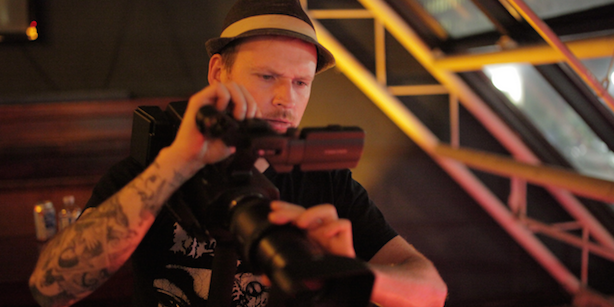 Music
Music
This high school teacher is making a grindcore documentary
by Joe Smith-Engelhardt
December 10, 2015
We talked to Toronto's Doug Brown, director of 'Slave to the Grind.'
Grindcore is a genre that is known for taking everything to the extreme. Combining influence from hardcore punk and death metal, it has developed into one of the most relentlessly intense types of music. With bands like Agoraphobic Nosebleed writing a 99-song album that lasts only 20 minutes, grindcore is in a realm of musicality unlike any other.
One Toronto high school teacher, Doug Brown, is making a documentary to capture the strange world of grindcore’s musicians and fans. Slave To The Grind will show the true face of a genre that relies on breaking the socially accepted ideas of what music can be.
Check out the trailer for the film below and read on for an interview with its equally one of a kind director:
AUX: How long has the documentary been in production?
Doug Brown: As I was wrapping up my last documentary probably about two years ago the idea hit me. I’m a very selfish filmmaker in that I kind of work on things that are of my interest. My last documentary was on collecting and I’m a huge record collector. What I spend the majority of my time and money on is grindcore. It’s been something that’s really devoured the last 10 years of my life in terms of what I’m listening to, so it made sense as the logical next step.
April 2014 was when we did our first shoot, then three months later we did another shoot while I was still shopping around my last documentary to festivals. It came full swing last fall and we had the Kickstarter campaign rolling for some production funds and I guess January until now is when we got 75 per cent of the footage.
Do you have a job outside of making documentaries?
Oh yes [laughs]. There are very few professional full time documentary filmmakers in Canada. I actually teach at a high school which is strange to some people with the severity of the content of this film. I teach at an independent school in mid-town Toronto and I run a film studies program. I also do some freelance cinematography and I film for bands, concerts and different things around the city but being a teacher with summers off and March break I have these dedicated production times.
This weekend’s a good example. I’m off school on Friday and then I’m going to Boston, and I’m there for a couple of days then I’m coming back. So it’s a bit of a juggle between the two things at once. The only way to make this happen obviously is having a very good production team. There’s about five of us that are working very intensively on this project. I can kind of pump out a feature every three years with this schedule.
What do your students think about your work outside of school?
I don’t have many students that are listening to this type of music so I think for them it’s very extreme and very foreign. Being a film studies teacher though, the film does lend itself to a lot of great lessons. I’m always making mistakes. Everything is trial and error so you just go out and any situations that come up you just find the best way of approaching it. So from an educational stand point every single day I can come back show them what I’m presented with and why I had to film at four o’ clock in the morning.
I try to use it as a teachable lesson. What the students don’t realize though is they are actually getting a first hand looks at things. I will very willfully show them lots of things. I very fortunately have many people interested in this project and little do they know the people who are seeing this first are 16-year-olds who have no clue what grindcore is. As for the content, I think they’re a little terrified of it.
How did you become interested in grindcore?
I’ve always been interested in heavy music and it just got heavier and heavier for me. When I was eight years old I was into Metallica, Anthrax, Slayer, and Type O Negative. I didn’t jump into grind until many years later. As a teenager I was interested in Napalm Death, but didn’t know what the genre was until later in high school and could apply it in retrospect to some of the heavier things I was listening to. I had a Terrorizer album and a Soilent Green album, but I just thought it was the fastest death metal I had ever heard.
I’m in my mid-30s now and was around 20 was when I decided for myself that grindcore is the best. I’m more of a metal head than a punk and it seems like everyone I’ve talked to leans more towards one of those especially considering that grindcore is very obviously borrowing from both of those elements, whether people like it or not.
What do you think sets grindcore apart from other forms of extreme metal?
I think if were talking about grind at its true core it has to sound wrong. It can’t sound pretty. If you think about the sound of grinding gears and how uncomfortable that is, there’s still something very comfortable about thrash metal, and if you look at the purpose of grindcore it’s a sheer abrasive entity. It shouldn’t be an easy listen. The second that I’m, like, nodding my head thinking this sounds so lovely, it’s no longer grindcore. I think it has to have that uncomfortable element.
Obviously too speed has a lot to do with it although it’s not all speed. The shortness of the tracks, although not all of them are short, comes into play as well. I think blast beats need to be in there but it doesn’t have to be all blast beats. If I hear a whole album and there’s not a single blast beat, to me that is probably not a grindcore album. These bands are borrowing from a grimy, filthy nastiness and it should sound like music that’s coming from a gutter.
What are fans of grindcore like?
I’m going to go ahead and say that just like any fanbase, if you’re listening to something that’s on the fringe of society you go to great lengths to find that music and the communities. I find there’s a greater sense of ownership over really liking grindcore then, say, the typical metal fan. You can be a casual Metallica fan but I don’t normally meet many casual Agoraphobic Nosebleed fans. You do get a level of intensity behind that passion and I think that the community is equally important to the musicians.
We don’t have a massive DIY scene here in Toronto. You can go see Napalm Death here at The Opera House, but it takes a bit of a leap of faith to go to a basement show or a potluck show that’s total DIY with no cover or event page. Those shows just kind of happen so it’s almost like there’s two tiers of grindcore fans.
Part of my goal for this film was to expose people to both sides of it. When you’re first getting into something you hear what’s most popular, but the further you dig you already realize that there’s so much more that’s going on in that scene. The more underground it is the more chance that you’re going to have intense fans with intense opinions and politics.
Have there been any difficult interviews for the documentary?
Of course. Developing a connection with somebody is very challenging. Not everybody in the world wants this film to be made. Like I said, when you have extreme personalities you’re going to get people who are vehemently against even the fact that I used Kickstarter to fund a film that represents something that is ‘do it yourself.’ But it’s not like I’m releasing something like a cassette. I’m releasing a feature-length documentary which has significant costs. Even if I cut all the corners, I’m still a hundred grand in the hole. No studio wants to fund a hundred thousand dollar documentary on grindcore, nor do I want them to because I want to have absolute control over it.
Some of these interviews have been people who are a little skeptical of the project, wondering what the intentions are. Usually after five or 10 minutes of talking with me the tone turns around though because this is all I do. I think superficially when you look at an outsider you assume they don’t know anything. All it takes is a quick period of time before they realize I may not be the best person for this job, but I’m the only one doing it. I’m at the point where I’m going to commit three years of my life to 12 hour days of transcribing interviews and focusing on storytelling and writing.
What do you hope to do with this documentary?
I am trying to humanize a genre and I think it’s important to recognize that musicians do things because they love it. This is not a documentary on a bunch of people thinking about how they’re going to be the next big thing. I am approaching that with the same mentality as a filmmaker. We have no aspirations of making a lot of money on this film.
Documentaries, especially in Canada, are one of the least lucrative genres of cinema. Couple that with one of the least lucrative genres of music. I’m doing this with the absolute best intentions on exposing a genre for what it is. It’s a bunch of passionate people who are doing it for no other reasons than they can’t not do it.
Tags: Music, Interviews, documentary, grindcore, metal





